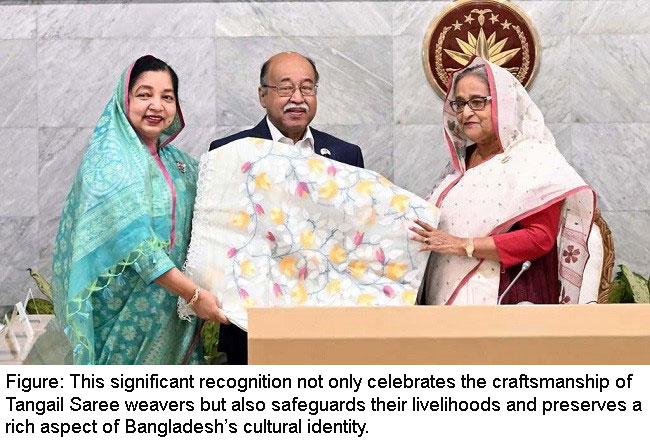
Category: INDIAN HERITAGE TEXTILE
Country: Bangladesh
Region: Asia
By Shafiun Nahar Elma
15th February, 2024 4:21 PM
In a move to protect and promote the cultural heritage of Bangladesh, the Tangail Sharee, a hand-woven traditional clothing, has recently been granted Geographical Indication (GI) status. This significant recognition not only celebrates the craftsmanship of Tangail Saree weavers but also safeguards their livelihoods and preserves a rich aspect of Bangladesh’s cultural identity.
It came amid a whirlwind of debate after India's ministry of industries received GI recognition for a saree named 'Tangail Saree of Bengal', with the authorization of the World Intellectual Property Organization.
In a Facebook post, the Indian Ministry of Culture asserted that the Tangail saree originated from West Bengal, a claim that controverts the saree's deep-rooted connotation with Bangladesh.
The move flashed a backlash in Bangladesh, with saree merchants, legal experts, and rights advocates enquiring how India could claim the GI recognition for the Tangail saree, given that Tangail is a region in Bangladesh and the handloom saree is a definitely Bangladeshi product.
Researcher, and President of the National Crafts Council of Bangladesh (NCCB), Chandra Shekhar Saha, said, “There is no doubt that Tangail district is situated in Bangladesh. So, we have a strong claim over Tangail Sarees.”
Deputy Director of (DPDT) Amin Mohammad Tajul Islam talked about the presence of a lack of awareness and seriousness on their part, which contributed to the delay in registering the Tangail Saree for GI tag.
Finally, Bangladesh's government agencies took action, with the Tangail district administration submitting a GI recognition application for the sarees on Feb 6. The application was afterward approved and officially gazetted by the DPDT.
Now Bangladesh has 22 GI recognized items with the inclusion of the Tangail Saree. Primarily, Jamdani Saree was registered in 2016. Muslin fabrics, Rajshahi silk, Hilsha fish, and Tangail’s Chamcham sweets are also notable examples.
Tradition and history
Centuries ago, Tangail, a district in central Bangladesh, became the hub of a traditional handloom industry, as witnessed by Ibne Battuta (Muslim scholar) in his travel tales. Initially settled by the Basak – a Hindu community who are invited by local landlords, landlords are from the Delduar, Santosh, and Gharinda areas of Tangail.
Descendants of Muslin Saree weavers were from Dhamrai and Chauhatta areas of Dhaka division. Basaks established their community in Tangail based on suitable weather and other positive conditions. Over time, other communities joined with them, including Muslim weavers known as ‘Jola’. Today, the Basak Community in Tangail’s Patrail Union is renowned for pioneering the original Tangail Saree-making process.
Significance of GI recognition
Bangladesh implemented a sui generis GI legislation, namely, the Geographical Indications of Goods (Registration and Protection) Act 2013, which provides a registration system for some of its reputed local and indigenous products. Custom weaving of the Tangail saree can be traced back to the British colonial period, surprisingly experiencing growth in the 19th century.
Granting of GI status is a testament to the unique qualities and the skilful handicrafts of the local weavers who meticulously create each piece. This recognition not only elevates the grade of the Saree but also ensures that only sarees produced in the Tangail region, adhering to specific standards and techniques, can bear the prestigious label of genuine product.
For the weavers and artisans who have been crafting Tangail Saree for a long time, generation to generation, assuring the authenticity of traditional dress, the tag helps to cherish traditional weaving techniques and ensures fair remuneration and values for artisans and also contributes to women’s economic empowerment.
Challenges ahead
This recognition is a significant achievement; challenges remain in effectively implementing and looking after the Tangail Saree production. Ensuring compliance with quality standards, preventing unauthorized use of the label, and addressing issues of fair compensation for craftsmen are rigorous aspects that require ongoing attention and support from relevant authorities and manufacturers.
In fine, GI recognition brings the security and promotion of Tangail Saree. It is extensively acknowledged that GI tagged products usually get almost 20% to 30% extra value in the international market compared to similar ones lacking the tag. For us, it is a significant part of our cultural heritage. It is high time for our government to be conscious about this issue and take proper steps to create the unique cultural identities and heritage of the products.
Courtesy: Textiletoday.com
Copyrights © 2025 GLOBAL TEXTILE SOURCE. All rights reserved.